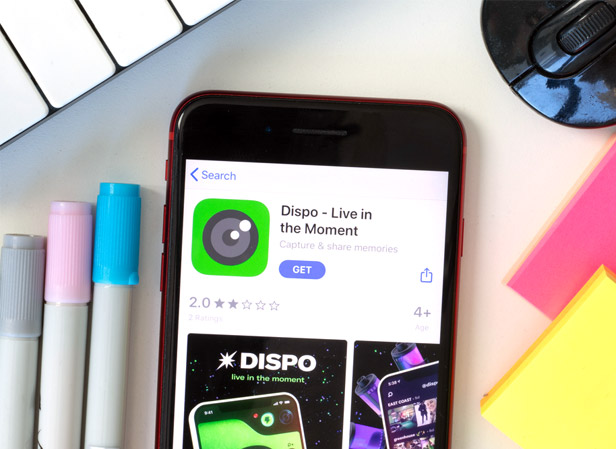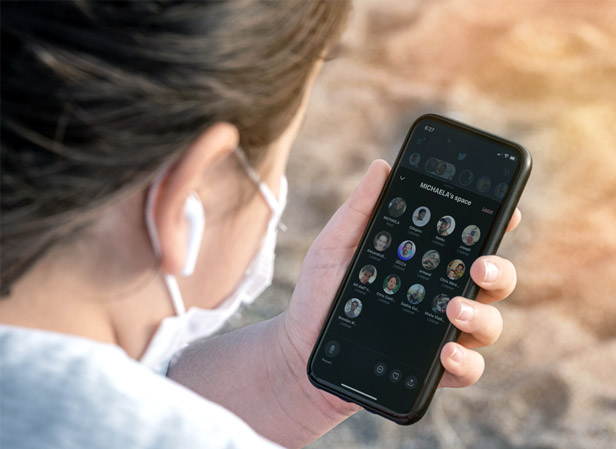These apps are changing the way people interact online.
Social media is moving beyond the endless scroll, it seems. Instead, tech companies are pushing toward better virtual and augmented reality, bringing back delayed gratification and enabling audio-only experiences.
Meetings in the Metaverse

SURREAL is a 3-D web-based virtual environment for online trade shows and events.
Could the next round of virtual events happen in virtual reality? Companies like Facebook and Roblox are banking on it. Facebook has devoted nearly 20% of its workforce, about 10,000 employees, to developing augmented and virtual reality devices, according to a report in The Information. CEO Mark Zuckerberg says the social media juggernaut wants to create “realistic avatars” that allow people in the virtual world to “make real authentic eye contact with someone and have real expressions that get reflected on your avatar,” according to The Verge.
Roblox, the video gaming company popular with kids and teens, is banking on making the “metaverse” a reality, according to CNBC. In geek terms, the metaverse is a digital world where people can get together virtually to play, work, meet and socialize – think of it like the book and movie Ready Player One.
These lofty ambitions are still more science fiction than reality, but another company just launched its own entry into enhanced virtual events. SURREAL is a 3-D, web-based virtual environment built with the same technology behind games like Fortnite and Disney’s CGI-heavy show The Mandalorian. The tech allows for realistic, real-time rendering and is customizable depending on clients’ needs. SURREAL is already working with big brands to host events like car shows and kitchen/home expos.
The tech was conceived in 2020 in direct response to the coronavirus pandemic, but SURREAL creators are hoping it will have relevance beyond that.
“SURREAL complements physical events without the transitional limitations of IRL, such as cost, carbon footprint or physical location,” says Josh Rush, co-founder and CEO of SURREAL. “While face-to-face communication is lasting and impactful, virtual connections are equally as powerful and important – and can seamlessly extend experiences by removing the limitations of time or location in the form of a preview, post-part or exclusive VIP offering.”
Bottom line: With improvements in VR hardware, Zoom meetings could one day become a quaint relic for salespeople.
Rediscovering the Joys of Waiting

Dispo is an iPhone app that mimics old-school disposable cameras.
Smartphones and streaming services have made instant gratification and binge-watching nearly universal concepts. But perhaps these trends are beginning to wear thin. Consider the discourse around buzzy Disney+ shows WandaVision and the aforementioned Mandalorian. Episodes were dropped once a week, rather than a whole season being dumped at once, a release structure designed to maximize the amount of fan theorizing and meme-making that occurred.
Dispo, a previously invite-only app available for iPhones, mimics the old-school disposable camera. Users can take as many photos as they want on the app. The only catch? They need to “develop” overnight and aren’t available until the next morning at 9 a.m. The photos can then be shared in solo or shared rolls or kept private.
Created by YouTuber David Dobrik, the deliberately nostalgic Dispo is perhaps an antidote to the highly curated, idealized world of Instagram. It was also the fourth-most-downloaded app within a week of being released, according to Entrepreneur. Though the app makes people wait, its motto is “Live in the Moment,” a phrase emblazoned all over a merch line recently dropped by Dispo.
Bottom line: Audio-only experiences let users make a human connection without worrying about doing their hair or changing out of their pandemic jammies.
Audio Is Worth 1,000 Pictures

Twitter expects to release its audio-only Spaces to everyone on the platform by April.
The biggest trend in social media is sound. After Clubhouse took the tech world by storm, all the major social media services are scrambling to release their own versions. Clubhouse lets you drop in on live conversations with everyone from celebrities to random strangers. You can also create your own rooms to build a following and establish yourself as an expert in your field.
Twitter plans to release its own version of audio rooms, called Spaces, to everyone on the platform by April, according to The Verge. And Instagram recently released Live Rooms, which allow up to four people to broadcast live at the same time. Though Live Rooms include video, there are indications that Instagram is working on an audio-only option as well, according to Pocket-Lint.
Bottom line: Audio-only experiences let users make a human connection without worrying about doing their hair or changing out of their pandemic jammies.